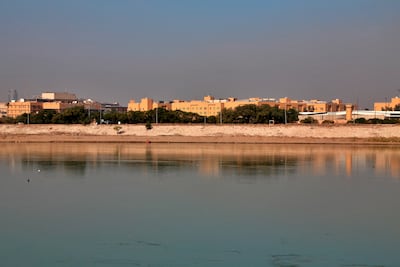Iraq and Turkey are working on a comprehensive agreement to solve a dispute over water rights, Iraq’s Water Resources Minister said on Sunday.
Iraq seeks a “fair and equitable” share of water from the Tigris and Euphrates rivers, which account for more than 90 per cent of Iraq's fresh water, said the ministry.
Both rivers originate in Turkey, while the Tigris is also fed by several tributaries from neighbouring Iran.
Turkey has built several dams on the rivers, while Iran has diverted tributaries to its land.
For decades, Iraq has failed to convince both countries to reach agreements on how to ensure a fair share of water. Both argue that they, too, suffer from scarcity of water and that Iraq uses outdated irrigation methods.
“We have been in lengthy discussions for years to reach a bilateral agreement [on water], but unfortunately we have not reached a bilateral deal with Turkey, Minister Aoun Diab Abdullah said.
“Now, the government’s intention is clear and serious with the aim to reach a comprehensive and complete agreement with Turkey that covers all aspects,” Mr Abdullah added.
“There are big interests, there is a trade exchange, there are economic interests, including the Development Road [project] and there are security matters,” he said.
“All will be put in one basket in which the water is the priority,” he continued, warning that “it’s dangerous to be lenient with this matter”.
He struck a positive tone to reach such a deal but refused to give more details on the discussions.

The minister hailed the co-operation with Iran this year that led to “a remarkable achievement” in releasing enough water to the Darbandikhan Dam in Diyala province in central Iraq and from Karun River to Basra in the south.
Water flows in Tigris have exceeded 600 cubic metres per second, thanks to the latest rains in the north and the release of water at one of Turkish dams for power generation, he said.
The current flows in Tigris are “at good levels” and are increasing the water reserves at dams which “were limited and we faced a great challenge in summer”, he said. “Now what is flowing to the reservoir of Mosul Dam is more than what is released and that will build up good water reserves,” he added.
But flows at the Euphrates “are still modest” with no more than 220 cubic metres per second, an issue that “has political dimensions related to Turkey's stance towards Qasad [US-backed, Kurdish-led Syrian Democratic Forces] and the Syrian government,” he added.
Turkey is one of Iraq’s main trade partners. Turkish President said in March that the volume of trade between the two neighbouring countries “broke the record”, exceeding $24 billion last year.
At least 500,000 barrels of oil a day were exported through a pipeline to the Turkish port of Ceyhan before they were halted in March over a legal battle between Baghdad and Ankara.
Turkey is also seeking Baghdad's co-operation to fight the Turkish-Kurdish dissident group Kurdistan Workers' Party, or PKK, which has bases in the Kurdistan Region of Iraq. PKK is designated as a terrorist group by the US and the EU.
Iraq has suffered severe environmental degradation and water scarcity as a result of climate change, alarming levels of pollution and mismanagement.
The country is experiencing its worst drought in decades, with temperatures above 50°C last summer. Many of Iraq’s lakes have shrunk.
The country is ranked the fifth most vulnerable in the world to climate change, the UN Environment Programme reported.


